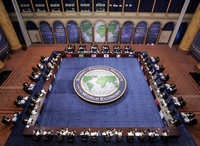When the global financial crisis struck roughly a year ago, the blogosphere was ablaze with all sorts of scary predictions of, and commentary regarding, ensuing conflict and wars -- a rerun of the Great Depression leading to world war, as it were. Now, as global economic news brightens and recovery -- surprisingly led by China and emerging markets -- is the talk of the day, it's interesting to look back over the past year and realize how globalization's first truly worldwide recession has had virtually no impact whatsoever on the international security landscape. None of the more than three-dozen ongoing conflicts listed by GlobalSecurity.org can be clearly attributed to the global recession. Indeed, the last new entry (civil conflict between Hamas and Fatah in the Palestine) predates the economic crisis by a year, and three quarters of the chronic struggles began in the last century. Ditto for the 15 low-intensity conflicts listed by Wikipedia (where the latest entry is the Mexican "drug war" begun in 2006). Certainly, the Russia-Georgia conflict last August was specifically timed, but by most accounts the opening ceremony of the Beijing Olympics was the most important external trigger (followed by the U.S. presidential campaign) for that sudden spike in an almost two-decade long struggle between Georgia and its two breakaway regions. Looking over the various databases, then, we see a most familiar picture: the usual mix of civil conflicts, insurgencies, and liberation-themed terrorist movements. Besides the recent Russia-Georgia dust-up, the only two potential state-on-state wars (North v. South Korea, Israel v. Iran) are both tied to one side acquiring a nuclear weapon capacity -- a process wholly unrelated to global economic trends.
The New Rules: Security Remains Stable Amid Financial Crisis

